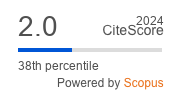Early nutritional support is associated with improved outcomes in respiratory failure
Keywords:
Respiratory insufficiency, Enteral nutrition, Parenteral nutrition, Assessment, Patient outcome.Abstract
Objective. To evaluate early feeding as a predictor of outcomein critically ill patients receiving prolonged mechanicalventilation. Patients and methods. A retrospective cohortstudy in four medical, surgical and multidisciplinary intensivecare units (ICU) in a tertiary referral center of adult patientsrequiring at least 48 hours of mechanical ventilation.Early feeding was defined as any nutritional support (enteralor parenteral) for at least 6 hours, started within 48 hours ofmechanical ventilation. The primary endpoint was hospitalmortality. The secondary endpoints were length of stay, andduration of mechanical ventilation. Univariate and multivariateanalysis were used as appropriate. Results. 394 out of4,546 patients admitted to the ICU were studied. Age (mean:95% confidence interval was 62 (60-63); female gender 43%;APACHE III 72 (70-75); APACHE III predicted hospitalmortality 36 % (33-39); ICU mortality 19%, hospital mortality28%, ventilation –free days 41 (39-44). Only 11% (3%enteral, 8% parenteral) were fed on day 1, 55% (30% enteral,25% parenteral) on day 4, and 88% (51% enteral, 37% parenteral)on day 7. Early feeding was associated with a reducedStandardized Mortality Ratio (number of observed hospitaldeaths/number of expected hospital deaths) of 0.53. Whenadjusted for various confounding factors such as severity ofillness, trauma, route of feeding, post-operative state or theuse of vasopressors, early feeding remained independently associatedwith decreased hospital mortality (Odd Ratio 0.51;95% confidence interval 0.26-0.98; p = 0.042). Conclusion.Early nutrition is associated with decreased hospital mortalityin patients receiving prolonged (more than 48 hours) invasivemechanical ventilation.Downloads
References
Bistrian BR, Blackburn GL, Vitale J, Cochran D, Naylor J. Prevalence of malnutrition in general medical patients. JAMA. 1976;235:1567-70.
Herrmann FR, Safran C, Levkoff SE, Minaker KL. Serum albumin level on admission as a predictor of death, length of stay, and readmission. Arch Intern Med. 1992;152:125-30.
Finkielman JD, Gajic O, Afessa B. Underweight is independently associated with mortality in post-operative and non-operative patients admitted to the intensive care unit: a retrospective study. BMC Emerg Med. 2004;4:3.
Anonymous. Perioperative total parenteral nutrition in surgical patients. The Veterans Affairs Total Parenteral Nutrition Cooperative Study Group. N Engl J Med. 1991;325:525-32.
Souba WW. Nutritional support. N Engl J Med. 1997;336:41-48.
Van den Berghe G, Wouters P, Weekers F, Verwaest C, Bruyninckx F, Schetz M, et al. Intensive insulin therapy in the critically ill patients. N Engl J Med. 2001;345:1359-67.
Intensive versus conventional glucose control in critically ill patients. NICE-SUGAR Study Investigators, Finfer S, Chittock DR, Su SY, Blair D, Foster D, Dhingra V, et al. N Engl J Med.
;360(13):1283-97.
Cerra FB, Benitez MR, Blackburn GL, Irwin RS, Jeejeebhoy K, Katz DP, et al. Applied nutrition in ICU patients. A consensus statement of the American College of Chest Physicians. Chest.
;111:769-78.
Weissman C. Analyzing intensive care unit lengths of stay data: problems and possible solutions. Crit Care Med. 1997;25:1594-600.
Griffiths RD. Supplemental nutrition; how much is enough? Intensive Care Med. 2000;26:838-40.
Popovich MJ. It’s alimentary: early enteral nutrition is better. Crit Care Med. 2001;29:2387-8.
Heyland DK, Dhaliwal R, Drover JW, Gramlich L, Dodek P. Canadian Critical Care Clinical Practice Guidelines C. Canadian clinical practice guidelines for nutrition support in mechanically ventilated, critically ill adult patients. JPEN J Parenter Enteral Nutr. 2003;27:355-73.
Doig GS, Heighes PT, Simpson F, Sweetman EA, Davies AR. Early enteral nutrition, provided within 24 h of injury or intensive care unit admission, significantly reduces mortality in critically ill patients: a meta-analysis of randomised controlled
trials. Intensive Care Med. 2009;35(12):2018-27.
Doig GS, Simpson F, Finfer S, Delaney A, Davies AR, Mitchell I, et al. Effect of evidence-based feeding guidelines on mortality of critically ill adults: a cluster randomized controlled trial. JAMA. 2008;300(23):2731-41.
Gajic O, Dara SI, Mendez JL, Adesanya AO, Festic E, Caples SM, et al. Ventilator-associated lung injury in patients without acute lung injury at the onset of mechanical ventilation. Crit Care Med. 2004;32:1817-24.
Bauer P, Charpentier C, Bouchet C, Nace L, Raffy F, Gaconnet N. Parenteral with enteral nutrition in the critically ill. Intensive Care Med. 2000;26:893-900.
Artinian V, Krayem H, DiGiovine B. Effects of early enteral feeding on the outcome of critically ill mechanically ventilated medical patients. Cest. 2006;129(4):960-7.
Martin CM, Doig GS, Heyland DK, Morrison T, Sibbald WJ. Southwestern Ontario Critical Care Research N. Multicentre, cluster-randomized clinical trial of algorithms for critical-care enteral and parenteral therapy (ACCEPT). CMAJ. 2004;170:197-204.
Krishnan JA, Parce PB, Martinez A, Diette GB, Brower RG. Caloric intake in medical ICU patients: consistency of care with guidelines and relationship to clinical outcomes. Chest.
;124:297-305.
Knaus WA, Wagner DP, Draper EA, Zimmerman JE, Bergner M, Bastos PG, et al. The APACHE III prognostic system. Risk prediction of hospital mortality for critically ill hospitalized adults. Chest. 1991;100:1619-36.





